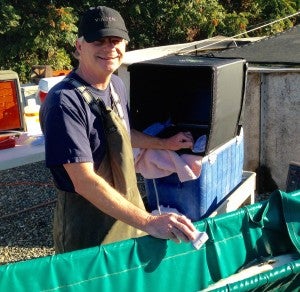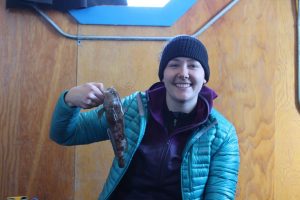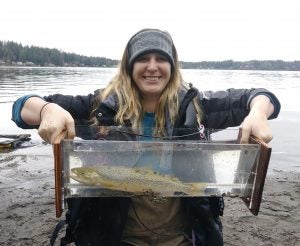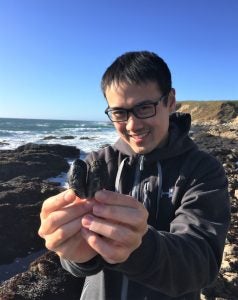Dr. Anne E. Todgham
 I am an environmental physiologist with an interest in understanding the molecular, biochemical and physiological mechanisms that underlie an animal’s capacity to cope with environmental change. I am fascinated by the diversity of physiological specializations (or strategies) used by animals to tolerate particular habitats that others would find very challenging. This interest has led my research to investigate how an animal’s physiology and environment interact to structure organismal stress tolerance. My current research program has an eye towards global climate change and addresses the general question of whether contemporary animals have the physiological flexibility necessary to buffer the unprecedented rates of environmental change, specifically their response to changes in multiple environmental variables. My research focuses mainly on aquatic organisms that are distributed along the California coast and estuaries (e.g. limpets, sea urchins, crabs, oysters and intertidal fishes), but extends to Antarctic fishes and aquaculture species.
I am an environmental physiologist with an interest in understanding the molecular, biochemical and physiological mechanisms that underlie an animal’s capacity to cope with environmental change. I am fascinated by the diversity of physiological specializations (or strategies) used by animals to tolerate particular habitats that others would find very challenging. This interest has led my research to investigate how an animal’s physiology and environment interact to structure organismal stress tolerance. My current research program has an eye towards global climate change and addresses the general question of whether contemporary animals have the physiological flexibility necessary to buffer the unprecedented rates of environmental change, specifically their response to changes in multiple environmental variables. My research focuses mainly on aquatic organisms that are distributed along the California coast and estuaries (e.g. limpets, sea urchins, crabs, oysters and intertidal fishes), but extends to Antarctic fishes and aquaculture species.
POSTDOCTORAL SCHOLARS
Dr. Sarah Nancollas
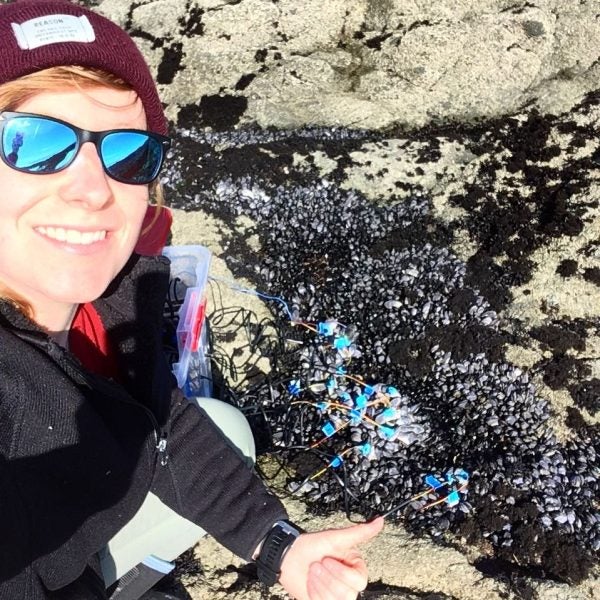 My interests lie in understanding how marine organisms respond to global environmental change, and understanding the physiological mechanisms utilised by animals to cope and adapt to these dynamic environments. I have primarily worked in coastal marine ecosystems and am especially interested in how intertidal organisms tolerate the changing environmental conditions that occurs with the movement of the tide. My current postdoc research is developing high throughput phenotyping of early developmental stages of shellfish and fishes with the goal to better characterize the changes in development and physiological performance of early life stages of organisms to environmental stressors. To learn more about the research I have worked on, please check out my website.
My interests lie in understanding how marine organisms respond to global environmental change, and understanding the physiological mechanisms utilised by animals to cope and adapt to these dynamic environments. I have primarily worked in coastal marine ecosystems and am especially interested in how intertidal organisms tolerate the changing environmental conditions that occurs with the movement of the tide. My current postdoc research is developing high throughput phenotyping of early developmental stages of shellfish and fishes with the goal to better characterize the changes in development and physiological performance of early life stages of organisms to environmental stressors. To learn more about the research I have worked on, please check out my website.
STAFF
Joel Van Eenennaam – Staff Research Associate (retired, but currently on volunteer status, to follow through on several projects)
I have been working in the Department of Animal Science as a research associate, since 1985. Research interests include: techniques for monitoring the reproductive conditions of wild and domestic sturgeon stocks; sturgeon aquaculture development, including broodstock management, spawning induction and husbandry methods; sturgeon gametogenesis and embryological development; and conservation hatchery development for stock enhancement. Current projects are: determining the causes of spontaneous “triploid” production in sturgeon hatcheries, training aquaculture staff on the techniques for broodstock management at new sturgeon farms, and enhancing tank spawning techniques for green sturgeon.
Sujung “Su” Chung – Junior Specialist
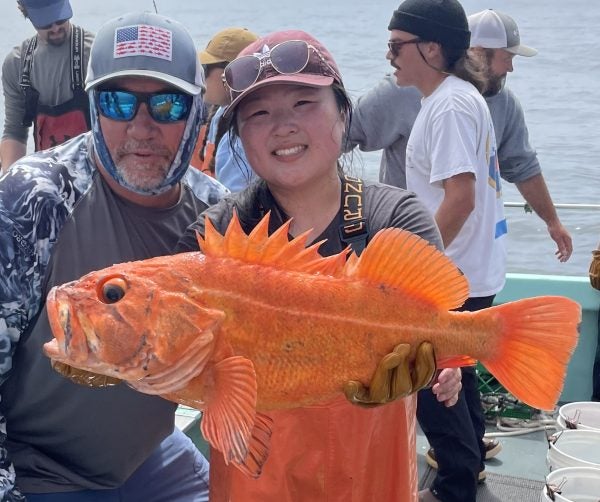
I graduated from UC Davis ’22 with a bachelors in Marine and Coastal Sciences and had worked in the Todgham lab as a student research assistant before entering this position. I had previously completed independent undergraduate research at the Bodega Marine Laboratory, studying behavior of the striped shore crab. My current work involves understanding the effects of thermal stressors on thiamine deficient salmon, hormone extractions of physically stressed juvenile white and green sturgeon, and groundfish stock assessments through the California Collaborative Fisheries Research Program. For the future, I hope to continue to work with marine conservation efforts and understanding the connections between physiology and behavior.
GRADUATE STUDENTS
Amanda Frazier – PhD candidate in Ecology
My interests lie in understanding how animals cope with anthropogenic stressors on molecular, organismal, and ecosystem-wide levels. I am especially interested in studying polar species, because their adaptations to stable environments make them particularly vulnerable to a changing climate. My master’s research in the Todgham lab focused on the potential metabolic performance benefits of a cannibal feeding strategy in burbot (freshwater cod) using cellular and organismal indices of metabolic performance. My PhD research in the Todgham lab focuses on how ocean acidification and ocean warming affect the behavior and physiology of multiple Antarctic fish species. I am also a NSF NRT Sustainable Oceans Fellow.
Hollis Jones – PhD candidate in Ecology
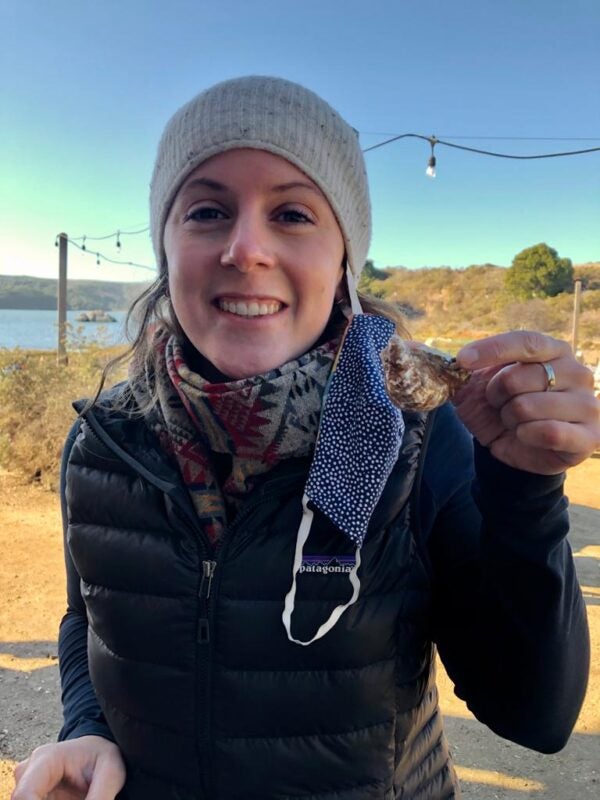 My research focuses on strategies for sustainable oyster culturing in an unpredictable and changing environment. I have spent my PhD collaborating with Hog Island Oyster Co.’s farm and hatchery teams to co-develop science-informed strategies that bridge the gap between research and application for place-based solutions. More specifically, I use genomic and physiological tools to better understand the effects of current and proposed management practices on Pacific oysters, the most commonly farmed oyster in the world. Prior to joining the Todgham Lab, I completed a masters at LSU that focused on the impacts of combined stressors on eastern oysters in the Gulf of Mexico and a Knauss Fellowship with NOAA working to facilitate research to application projects. I am also a member of the UC Davis Public Scholars for the Future Program, NSF NRT Sustainable Oceans Fellow, and recipient of the Kenneth K. Chew Student Research Grant.
My research focuses on strategies for sustainable oyster culturing in an unpredictable and changing environment. I have spent my PhD collaborating with Hog Island Oyster Co.’s farm and hatchery teams to co-develop science-informed strategies that bridge the gap between research and application for place-based solutions. More specifically, I use genomic and physiological tools to better understand the effects of current and proposed management practices on Pacific oysters, the most commonly farmed oyster in the world. Prior to joining the Todgham Lab, I completed a masters at LSU that focused on the impacts of combined stressors on eastern oysters in the Gulf of Mexico and a Knauss Fellowship with NOAA working to facilitate research to application projects. I am also a member of the UC Davis Public Scholars for the Future Program, NSF NRT Sustainable Oceans Fellow, and recipient of the Kenneth K. Chew Student Research Grant.
Jasmine Manny – PhD student in Ecology

Hello fellow scientist, nature enthusiast, or otherwise curious human! My research interests are tied to some of my favorite childhood memories with my family, which were fishing, camping, and playing in my grandma’s East Bay area garden. Several undergraduate research experiences that I participated in while at CSU, Sacramento helped guide me to my current home– Anne Todgham’s lab within the UC Davis Graduate Group in Ecology PhD program. During my undergraduate years, I studied captive fish behavior (cichlid mating and competition under different biotic and abiotic factors), diversity and distribution analyses of marine intertidal gastropods in Costa Rica, and in my last 2 summers, larval insect behavior (mayfly drift, foraging, and predator susceptibility under biotic and abiotic stress) in the Colorado Rockies. Afterwards, I had the opportunity to study water quality dynamics and learn how to collect and monitor real-time temperature, dissolved oxygen, chlorophyll, and salinity (specific conductivity as a proxy) data collected throughout the Sacramento-San Joaquin River Delta as a part of current environmental and fish regulatory monitoring efforts. With all this considered, I am passionate about ecology and fisheries research, and specifically interested in studying how fish navigate different biotic and abiotic factors in the aquatic environment to complete their life cycle. After getting my feet wet in microbial ecology and parasitology of coastal marine flatfish during my master’s studies at CSU, Northridge, I hope to investigate if and to what extent microbial symbionts of developing salmonids are involved in fish physiological capabilities in stressful environments. Please check out my website if you would like to know more!
Leah Mellinger – PhD candidate in Animal Biology
I am interested in how fish respond to environmental stressors ranging from biotic (such as parasites and pathogens) to abiotic (such as poor water quality and toxicants) and using those responses to map population health and potentially develop management tools for assessing population health. With the increasing threat of climate change and other anthropogenic stressors, developing strategies to assess how fish populations are coping is incredibly important. I am specifically interested in assessing Chinook salmon smolt physiological stress levels during their migration and smoltification as well as assessing forage fish species population health. I am also an NSF NRT Sustainable Oceans fellow.
Fred Nelson – PhD candidate in Ecology
I am interested in studying the effects of predicted climate change on natural and 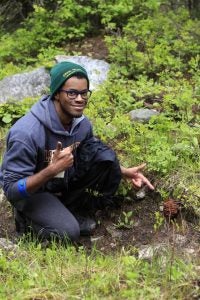 already altered ecosystems and how organisms are adapting to these new extremes. Currently, I’m studying the variation in phenotypic plasticity in response to climatic stressors across temporal scales, using the western mosquitofish, Gambusia affinis, as a model species.
already altered ecosystems and how organisms are adapting to these new extremes. Currently, I’m studying the variation in phenotypic plasticity in response to climatic stressors across temporal scales, using the western mosquitofish, Gambusia affinis, as a model species.
Anthony Tercero – PhD candidate in Integrative Genetics and Genomics

I am a PhD Candidate in the Integrative Genetics and Genomics (IGG) Graduate Group. I am co-advised by Dr. Anne Todgham from the Department of Animal Science, and Dr. Andrew Whithead from the Department of Environmental Toxicology. After eight years of service in the U. S Army and deployment to Iraq, I earned my B.Sc. in Molecular Biology and M.Sc. in Biology from the Place Lab at Sonoma State University, where I studied the genetic basis of extreme cold adaptation in Antarctic fish. My current interests focus on understanding the mechanisms responsible for the persistence and inheritance of reproductive and behavioral health consequences following early-life exposure to endocrine-disrupting chemicals (EDCs) using the self-fertilizing Mangrove killifish (Kryptolebias marmoratus). By leveraging the unique clonality of Mangrove killifish, I aim to detangle environmental and genetic contributions to EDC-induced health outcomes. Furthermore, by using multiple genetically distinct lineages of mangrove killifish, I aim to uncover gene x environment interactions to determine how genetic variation influences pollution sensitivity and transmission of environmentally induced diseases. This proposed work will have broad implications for biomarker discovery and identification of genetic risk factors using an innovate model system, corroborating human studies to inform and address environmental health challenges. I am a dedicated advocate for research opportunities and outreach. As a Team Leader for Stem for Girls, mentor for the Sheldon High School Biotechnology Academy, and contributor to the UC Davis Young Scholars Program, I actively seek collaboration with hardworking undergraduate students.
Tinh Ton – PhD candidate in Animal Behavior
I study how keystone species shape population and community processes within tide pools. Sea stars consume mussels which allows other larvae species to settle, contributing to species diversity in tide pool ecosystems. My research focuses on how Ochre seastars detect KEYSTONEin, a protein produced by the California mussel, to use as a feeding stimulus. I am exploring the effects of ocean acidification on this chemical cue and its role in predator-prey interactions in order to assess tide pool biodiversity under climate change.
UNDERGRADUATE STUDENTS
FORMER LAB MEMBERS
Postdoctoral Scholars
Dr. Christana Pasparakis (2020-2022)
Dr. Milica Mandic (2019 – 2022)
Dr. Richelle Tanner (2020-2021)
Dr. Nathan Miller (2013-2015)
Doctoral Students
Sarah Nancollas – PhD 2023
Annelise Del Rio – PhD 2020
Michaiah Leal – PhD 2020
Brittany (Bjelde) Davis – PhD 2018
Masters Students
Sierra Reese – MS Thesis 2023:
Toni Lohroff – MS Thesis 2022: Rearing temperature and parentage influence development of early post-hatch Longfin smelt (Spirinchus thaleichthys) in captive culture
Amanda Frazier – MS Thesis 2019 :Does a cannibal feeding strategy impart differential metabolic performance in young burbot (Lota lota maculosa)?
Madeline Drake – MS Thesis 2016: The role of stochastic thermal environments in modulating the thermal physiology of an intertidal limpet, Lottia digitalis
Daniel Chase – MS Thesis 2014: Effect of species assemblage on juvenile growth and condition in three California estuarine fishes.
Erin Flynn – MS Thesis 2014: Ocean acidification exerts negative effects during warming conditions in a developing Antarctic fish.
Sara Boles – MS Thesis 2014: Physiological cost of climate change in the native Olympia oyster, Ostrea lurida.
Christina Pasparakis – MS Thesis 2013: Role of sequential low-tide-period conditions on the thermal physiology of summer and winter laboratory-acclimated fingered limpets, Lottia digitalis.
Katie McLean – MS Thesis 2013: Effect of food availability on the growth and thermal physiology of juvenile Dungeness crabs (Metacarcinus magister).
Brittany Bjelde – MS Thesis 2013: Thermal physiology of the fingered limpet Lottia digitalis under emersion and immersion.
Undergraduate Students
John Ameil Flores (2021) – Climate change and sex biased population effects on mosquitofish
Sierra Reese (2020) – Howard University EEGAP Intern) Behavior of Antarctic dragonfish
Gabriella Mukai (2020) – Inducible stress tolerance in Chinook salmon fry
Sarah Chavez (2019)- The effects of developmental exposure to warming and hypoxia on sex ratios in Chinook salmon
Erin de Leon Sanchez (2019) – RNA extraction from M. californianus: the effects of food, temperature, tide cycles, and heat shocks on transcriptomics, proteomics, metabolomics, and whole organism physiology
Raven Barbera (2019) – Behavioral responses to hypoxia in diploid and triploid white sturgeon
Jessica Escamilla (2019) – The effect of centrifugation speed on enzyme activity in white sturgeon
Lorenzo Olano (2019) – Thermal tolerance of the lined-shore crab, Pachygrapsus crassipes.
Bryan Puentes (2017) – Effects of temperature and food restriction on survival, growth and physiological performance of larval green sturgeon
Brigitte Clark (2016, UC LEADS Program) – Developing blood smear analysis for assigning white sturgeon ploidy groups
Monica Serrano (2017) – Physiological responses of native and non-native fishes to warming and salinity stress, Antarctic fish enzyme activity
Emily Perry (2017) – Behavioral responses of rockfish to ocean acidification and hypoxia
Frederick Nelson (2015, 2016, Howard University EEGAP Intern) – Effects of elevated temperature and ocean acidification on the cardiorespiratory physiology of an Antarctic fish
Alexandra Resnick (2016) – Impacts of ocean acidification and warming on activity behavior in juvenile Antarctic emerald rockcod
Janet Garcia (Summer 2013, SFSU REU BREED Program) – Metabolic response of Ilyanassa obsolete egg capsules to increased temperature under immersed and emersed conditions.
Monica Tang (2013) – The combined effects of elevated temperature and low salinity on the physiological performance of adult Olympia oysters, Ostrea lurida.
Arthur Nguyen (2013) – Lipid analysis in juvenile oysters to assess metabolic responses to environmental change
Travis Siapno (2013) – Development of an assay to measure lipids in early developmental stages of oysters.
Karen Bueno (Summer 2012, SFSU REU BREED Program) – Understanding the tolerance of native Olympia oysters to fluctuations in environmental salinity.
Hazel DeVera (2012) – The effects of thermal stress during aerial exposure on protein homeostasis of the owl limpet, Lottia gigantea.
Maxwell Everett (2012) – Oxidative stress and antioxidant defenses in Antarctic fishes.
Corinne Calhoun (Summer 2011, SFSU REU BREED Program) – Distribution and abundance of juvenile Dungeness crabs in the San Francisco Bay.
Emily Blanchard (2011 – 2012) – Cloning and sequencing of candidate genes involved in ion and acid-base regulation in Antarctic fishes.
Janet Nguyen (2011 – 2012) – Cloning and sequencing of candidate genes involved in ion and acid-base regulation in Antarctic fishes.
